3D Truss Models
-
Modified an existing truss roof to make it a half hip truss set:
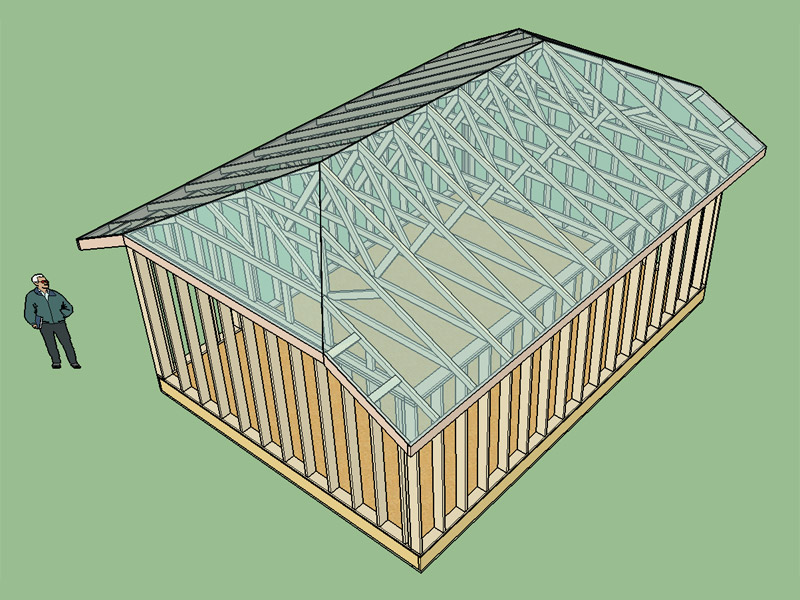
View model here:
3D Warehouse
3D Warehouse is a website of searchable, pre-made 3D models that works seamlessly with SketchUp.
(3dwarehouse.sketchup.com)
This will be my first venture into more complex truss systems. I figured I would cut my teeth on the half hip (Jerkin Head, Tudor Hip) truss set first before attacking the more complex full hip variants of which there are many.
After sketching this model up and examining the geometry I now have a number of questions:
-
Are my roof planes correct? Note that I have drawn the apex of the hip roofs at the edge of the last full truss and not at its centerline. Not entirely sure what is common practice in this regard.
-
I've shown some non-structural outlookers along the rake. What would the outlookers along the half hip portion look like?
-
If I use structural outlookers how would those be framed in over the hip section?
-
Does the apex of the half hip typically coincide with the next truss or could it land somewhere between trusses? ie. the half hip length is some multiple of the truss spacing.
-
Is the hip section usually the same pitch as the rest of the roof? There is really no reason why it has to be.
-
As the length of the half hip increases the depth of the gable end truss decreases as does the first inboard truss. What is the practical limit for the minimum depth of the first inboard truss?
-
Does anyone have some shop drawings of this type of truss set that I can study?
-
-
As previously noted the web dialog from the plugin can actually be used external to SketchUp to explore gambrel attic geometry:
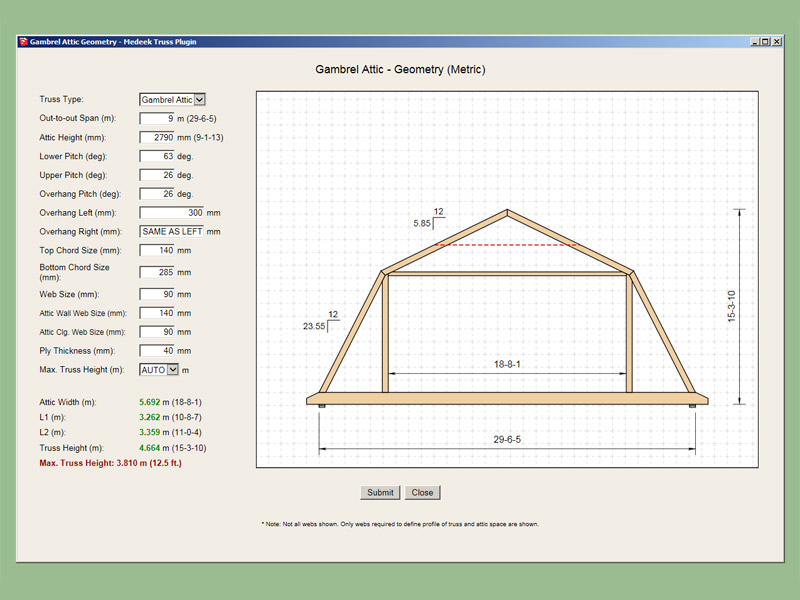
Imperial Units:
Metric Units:
I might develop this into a web based app which would allow one to generate 2D AutoCAD geometry (.dwg) of the truss profile.
-
With non-structural lookouts would you frame them something like this? This question is mostly directed at the contractors and carpenters out in the field who actually have to build these roofs. Typically as an engineer I never worry about these details especially when they are non-structural.
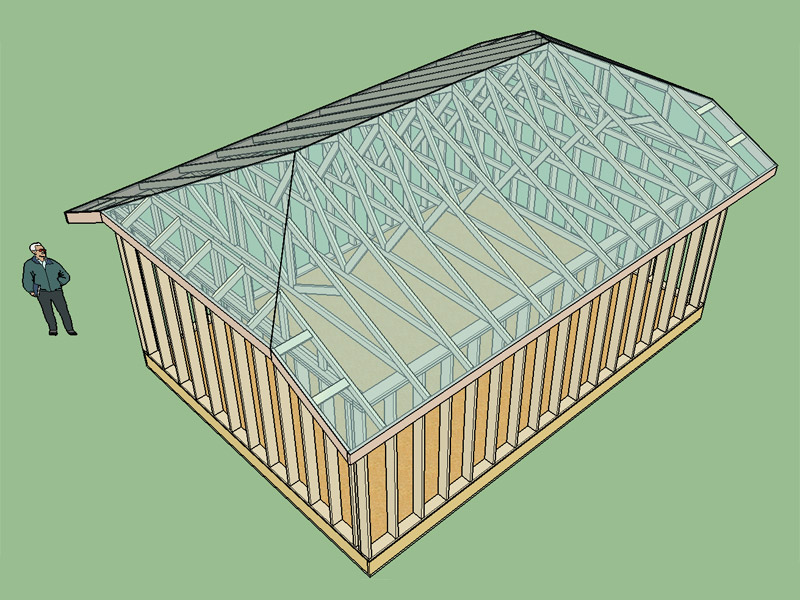
In my opinion they aren't really doing a whole lot, much better to drop the gable truss and then cantilever them from the first in board truss (ie. structural outlookers).
-
Hip Truss Algorithm:
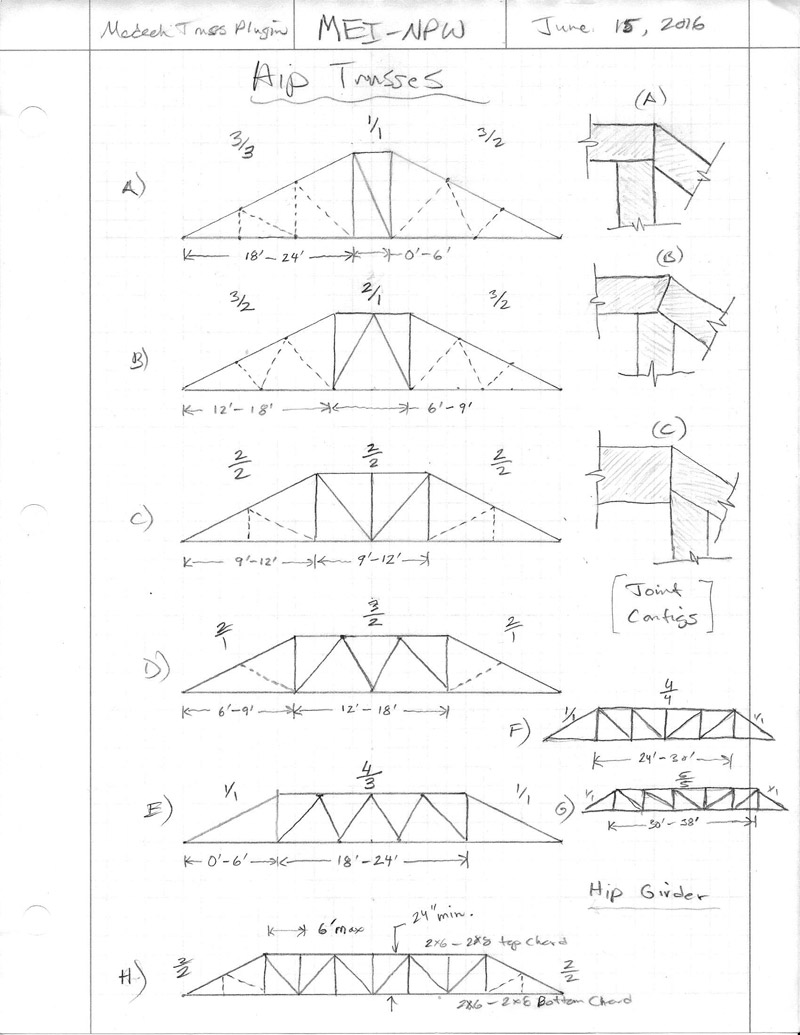
-
I wish I would know what you're talking about, so I could help you. All this english roof terms are just... well foreign to me.

-
Version 1.6.3 - 06.19.2016
- Added Gable Dormers to the Minor Roof Sub-Menu (dormer walls only).
For now only the walls of the dormer are created:
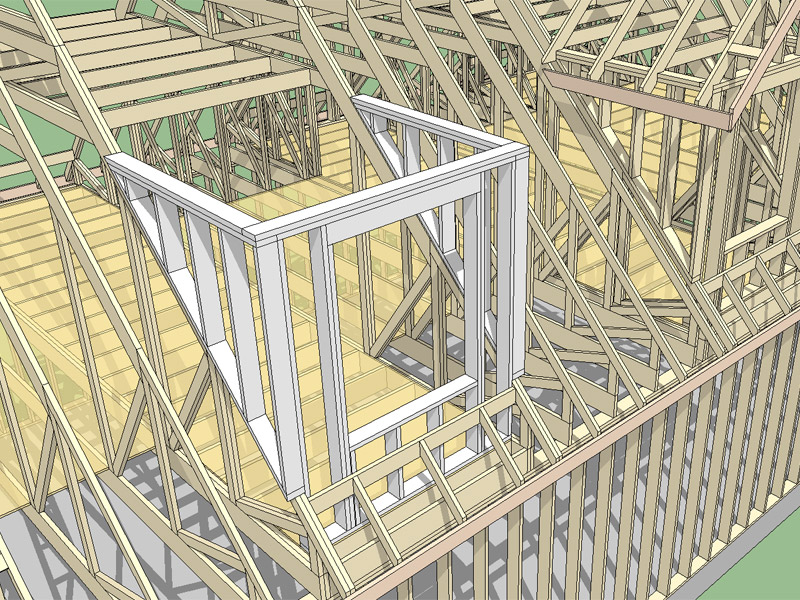
View model here:
3D Warehouse
3D Warehouse is a website of searchable, pre-made 3D models that works seamlessly with SketchUp.
(3dwarehouse.sketchup.com)
I am still ironing out the details on how to best model the roof geometry. I will probably offer either a rafter or truss option. Other details such as multiple windows will also come later.
For now please test the metric and imperial wall creation. I will probably need to post a tutorial video on how to use this feature since it involves selecting the main roof plane (top of a rafter or truss) and then two points that define the width/exterior corners of the dormer.
-
Medeek,
A 3D Kubity model may help viewers explore your 3D Models
(refer to private PM note)https://www.kubity.com/p/tWg5zg
[kubity:2u0sejcq]tWg5zg[/kubity:2u0sejcq]
-
Outlookers oriented horizontally with gable end truss top chord dropped:
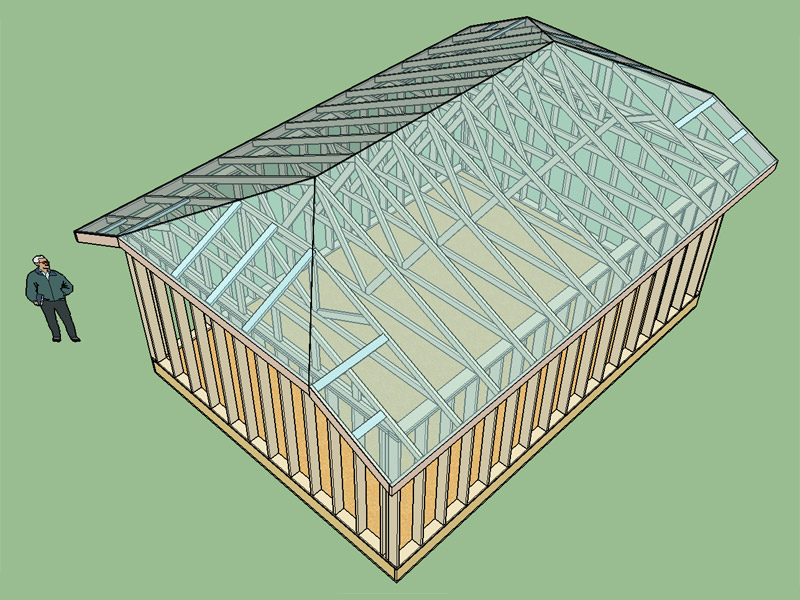
View model here:
3D Warehouse
3D Warehouse is a website of searchable, pre-made 3D models that works seamlessly with SketchUp.
(3dwarehouse.sketchup.com)
https://www.kubity.com/p/g2XGL2
[kubity:nam3sa03]g2XGL2[/kubity:nam3sa03]
-
I like the ability to embed the kubity file directly, that makes it easy to view and convenient. The only downside is kubity does not display the edges so it is a bit hard to analyze the model fully. Is there a way to turn on edges in kubity?
The 3D Warehouse has the button that allows one to view the model in the 3D WebGL viewer, so to rotate and view the model in the browser is possible.
-
Medeek,
I put your question to the Kubity forum on:
http://sketchucation.com/forums/viewtopic.php?f=400%26amp;t=65244%26amp;p=598242#p598242Discussion can be viewed here:
http://sketchucation.com/forums/viewtopic.php?f=400%26amp;t=65244%26amp;p=598268#p598268No definitive answer yet.
-
Version 1.6.2 - 06.14.2016
- Added Symmetric Cathedral truss type, configurations: (AUTO).
- Metric input enabled for symmetric cathedral truss type.
- Added gable end trusses for symmetric cathedral truss type.
- Structural outlookers (vert. & horz.) enabled under advanced roof options for Symmetric Cathedral truss type.
Various sizes and configurations of a symmetric cathedral truss:
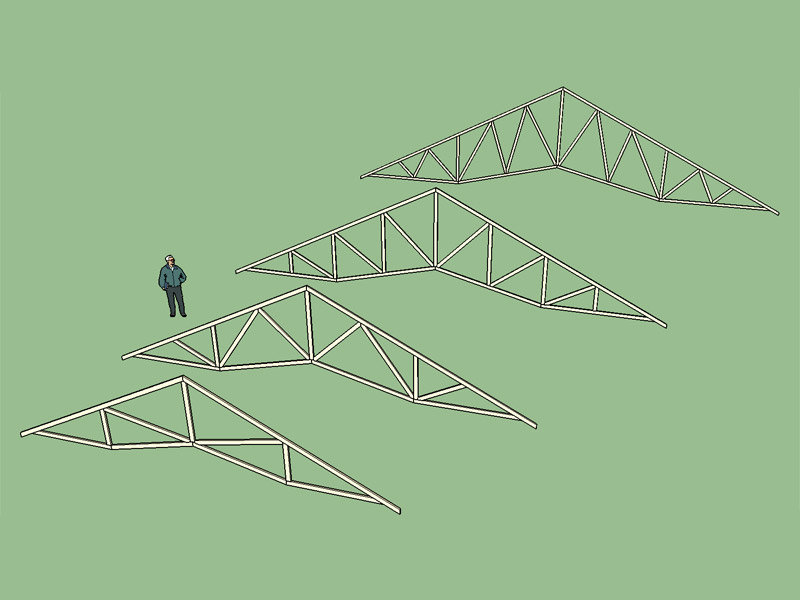
View model here:
3D Warehouse
3D Warehouse is a website of searchable, pre-made 3D models that works seamlessly with SketchUp.
(3dwarehouse.sketchup.com)
-
Testing the dormer (wall) feature out with a gambrel attic truss:
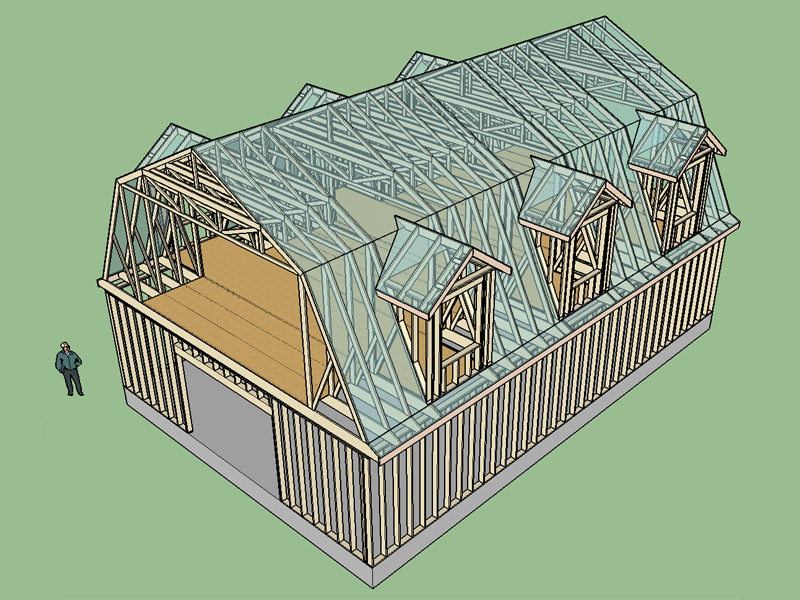
These dormers have a typical gable profile but it might be useful to have a gambrel dormer option as well to match with a gambrel style roof. Note that I have not shown all of the ladder framing in the model. On a roof like this it could get quite extensive.
To generate the dormer roof I just used my rafter roof feature and then trimmed the elements back manually.
View model here:
3D Warehouse
3D Warehouse is a website of searchable, pre-made 3D models that works seamlessly with SketchUp.
(3dwarehouse.sketchup.com)
-
Same barn with a few more details. For gambrel attic advanced options I should also include the option for a crow's beak as shown in this model and the option to set the extension.
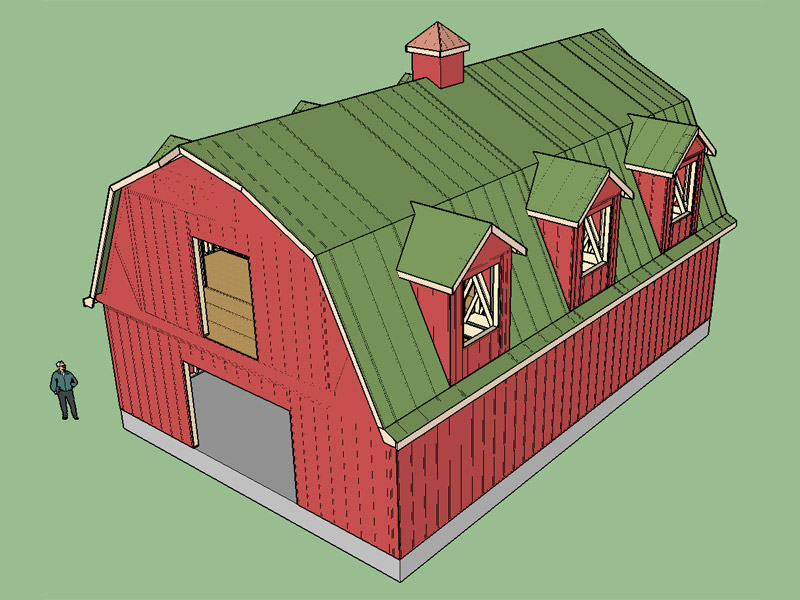
View model here:
3D Warehouse
3D Warehouse is a website of searchable, pre-made 3D models that works seamlessly with SketchUp.
(3dwarehouse.sketchup.com)
-
@medeek said:
For gambrel attic advanced options I should also include the option for a crow's beak as shown in this model and the option to set the extension.
This would be a GREAT addition! Is there any logic to how far back along the main fascia that the crow's beak is supposed to merge in? Could this be an option along with the depth for the extension?
-
Internal view:
Views will be available for Kubity in few weeks
Crows Beak picture attached for clarity of term used.
-
@mtnarch said:
@medeek said:
For gambrel attic advanced options I should also include the option for a crow's beak as shown in this model and the option to set the extension.
This would be a GREAT addition! Is there any logic to how far back along the main fascia that the crow's beak is supposed to merge in? Could this be an option along with the depth for the extension?
I hadn't thought this through enough. The logic for the crow's beak requires two inputs as you correctly stated:
1.) The extension length from the rakeboard measured from the exterior edge of the rake to the furthest point of the crow's beak.
2.) The merge distance along the main fascia where the crow's beak merges back into the rakeboard.
The logic to create this actually won't be that difficult I just need to get to it.
-
Dormer Framing - Ceiling option
The attached image from:
Canadian Wood-Frame House Construction p. 148
http://www.cmhc-schl.gc.ca/odpub/pdf/61010.pdfshows ceiling for a flat section option. (ideal for services as electrical and other)
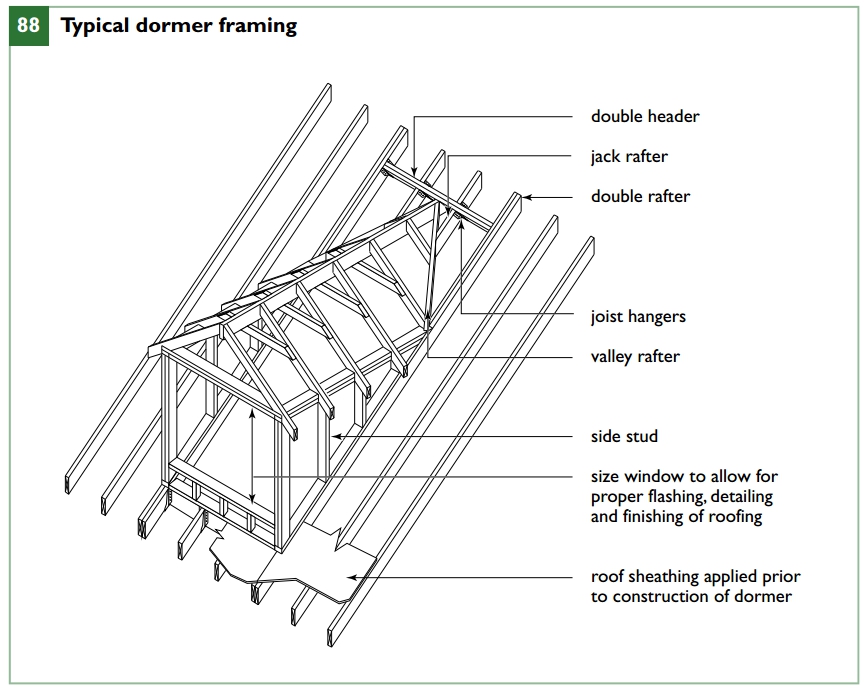
-
The problem with dormers is there is a number of ways to frame them up. The way I like to frame attic dormers when using trusses is have the front wall rest on the attic subfloor and then the side walls rest on the truss top chord. I've also seen it where all dormers walls rest on the subfloor of the attic.
With a rafter roof that is open the entire dormer is often framed on the roof per facer's drawing (I call it a floating dormer).
-
Under advanced options for gable roofs (truss and rafter) I am thinking about adding a "roof return" option. Any thoughts on "greek returns":
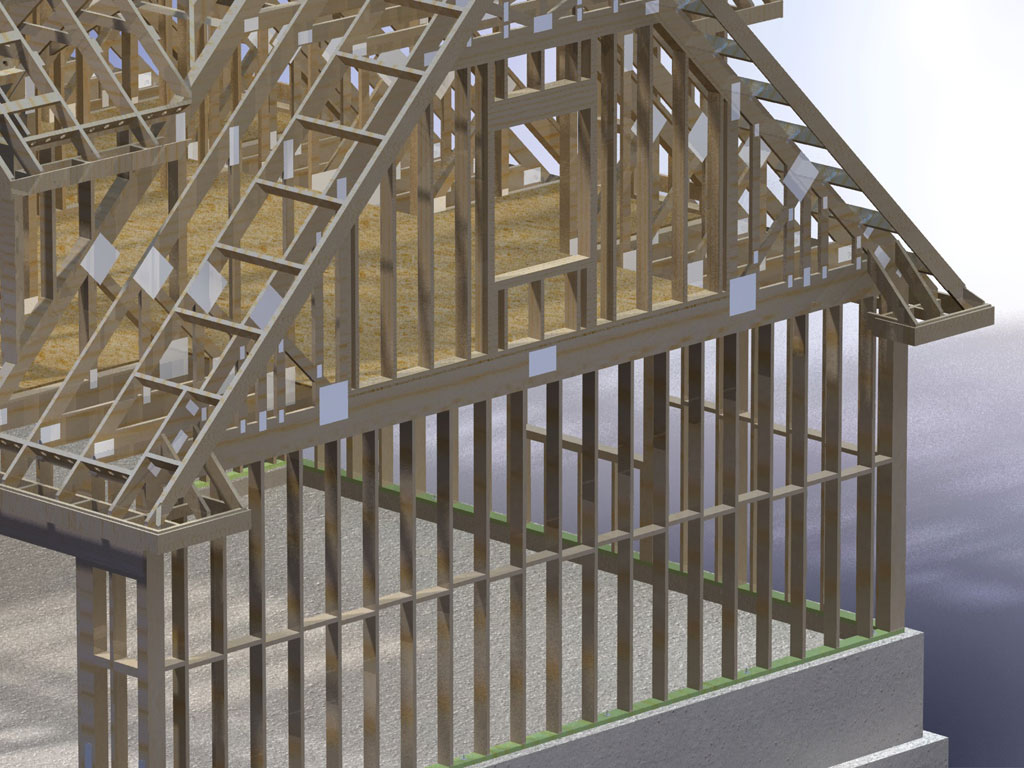
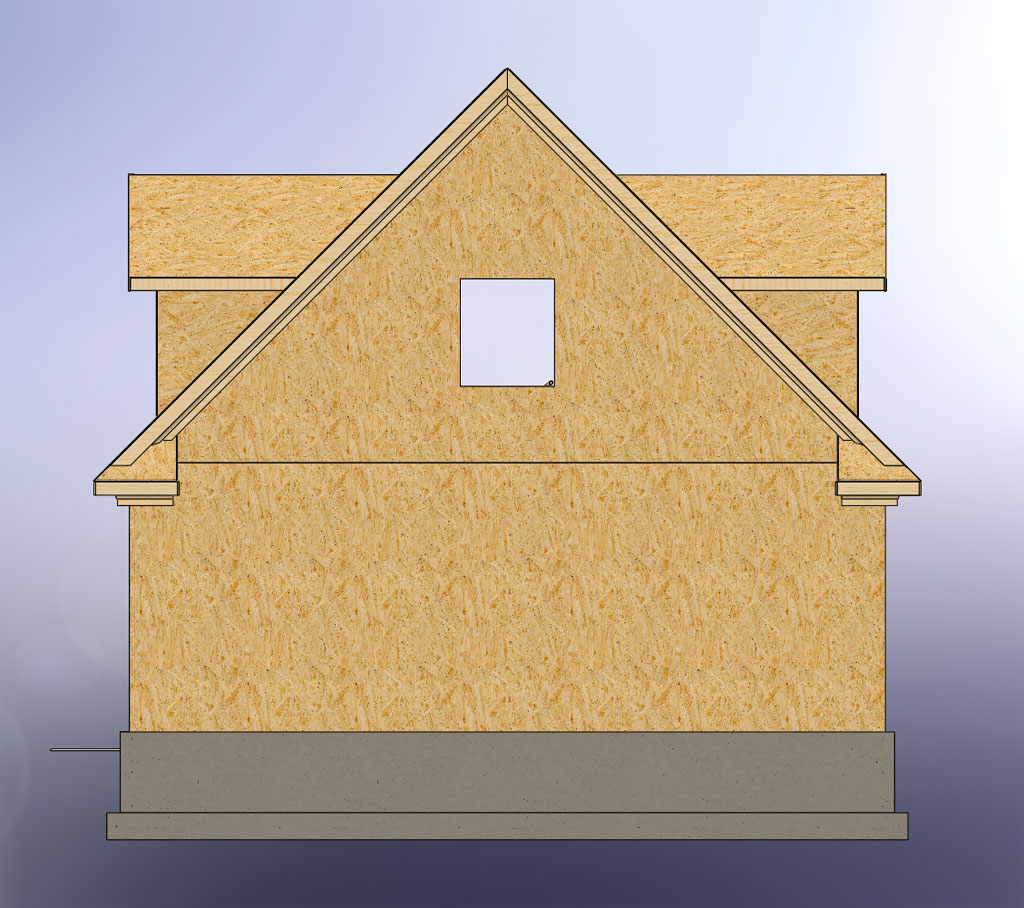
The images above shows a roof return with a gable termination, alternatively this could end with a hip termination as in below:

Or with a full greek which stretches across the entire span:
Does anyone have any specific framing details on how best to frame these roof elements?
As far as the logic to add them into the plugin it won't be a big deal, just an additional module that plugs into the advanced roof module.
To simplify things I would used the same pitch on the returns as on the main roof. The three variables would be:
1.) Return Type: Gable, Hip, Full
2.) Length of the Return
3.) Extension beyond Rake -
A quick study of a hip return:
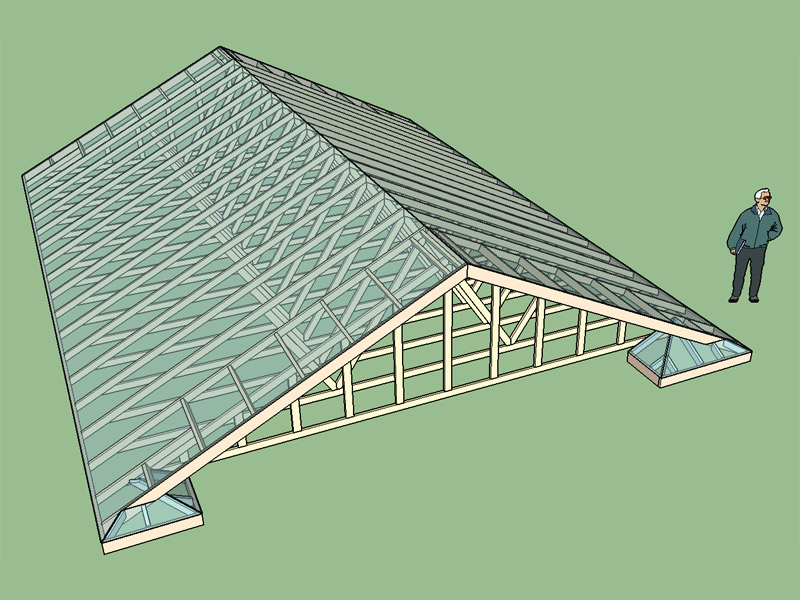
Notice the inboard hip rafter does not terminate at the gable wall when the return length is too short. This poses some interesting framing given this situation, note the return on the right side of the roof is this case, not entirely sure how one would support/terminate the hip rafter in this situation.
When the return length allows the hip rafter to terminate at the gable wall then the framing is fairly straightforward.
The hip rafter will terminate at the gable wall when the return length is greater than or equal to twice the total return extension (Rakeboard Width + Gable Overhang + Return Extension).
The other question that I have is how to apply the sheathing to these small odd shaped roof segments. How far up under the overhang should the sheathing extend?
View model here:
3D Warehouse
3D Warehouse is a website of searchable, pre-made 3D models that works seamlessly with SketchUp.
(3dwarehouse.sketchup.com)
Advertisement








